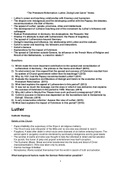Other
The Reformation Pre-U Paper 2b Early Modern European History Notes (Written by a D1 Student)
- Institution
- CIE
In need of some help to smash your Pre-U exam on the Reformation? Then look no further! Written by a D1 student who later obtained a first in History from Oxford, these detailed notes can help you save time and obtain a better mark. The 46 pages of word-processed notes cover the following cor...
[Show more]



